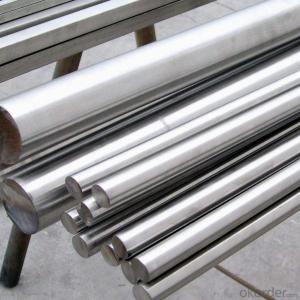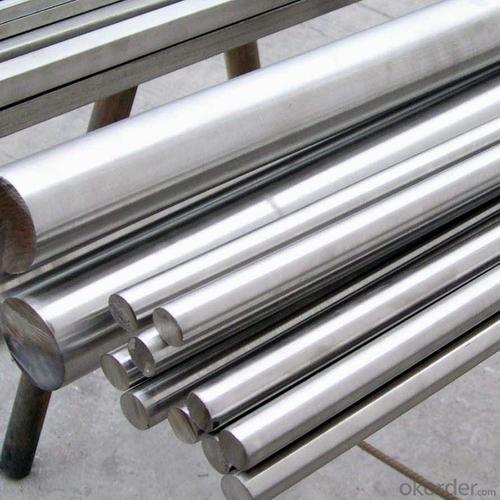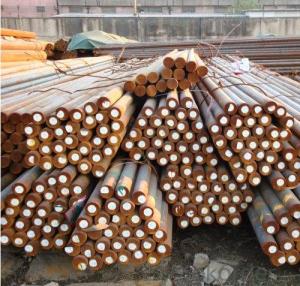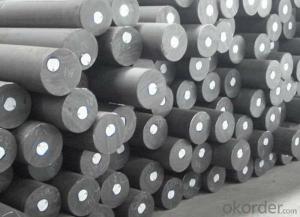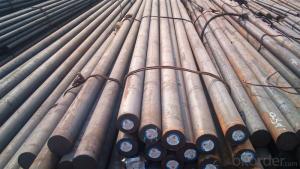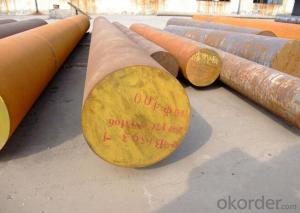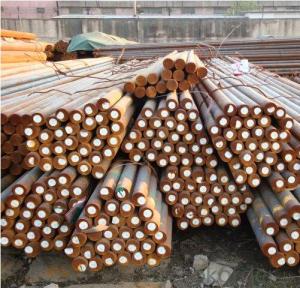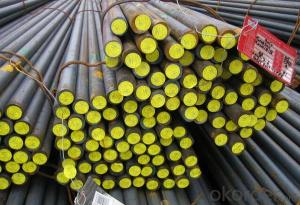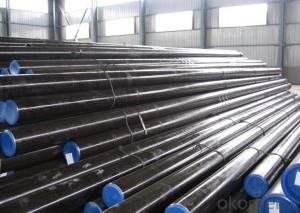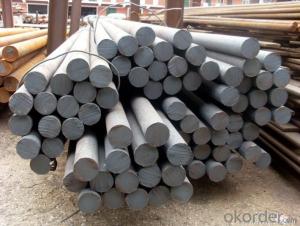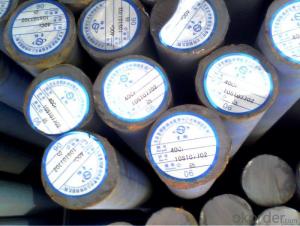Special Steel Alloy Steel Round Bar SAE8620
- Loading Port:
- China main port
- Payment Terms:
- TT OR LC
- Min Order Qty:
- 30 m.t.
- Supply Capability:
- 10000 m.t./month
OKorder Service Pledge
OKorder Financial Service
You Might Also Like
Specification
Product Information
1 Standards and Chemical Composition:
BS | AISI | JIS | DIN |
850M20 | SAE8620 | SNCCM220(H) | 21NiCrMo2 1.6523 |
C | Si | Mn | P | S | Cr | Ni | Mo |
0.18-0.23 | 0.15-0.35 | 0.70-0.90 | ≤0.035 | ≤0.035 | 0.4-0.6 | 0.4-0.7 | 0.15-0.25 |
2 Brief Introduction:
Dimension | 14-350mm |
Length | 2-13m or as per your request |
Delivery condition | Hot rolled |
Heat Treatment | Normalizing, Annealing, Quenching |
Packing | Standard seaworthy packing or according to your requirements |
Product Show
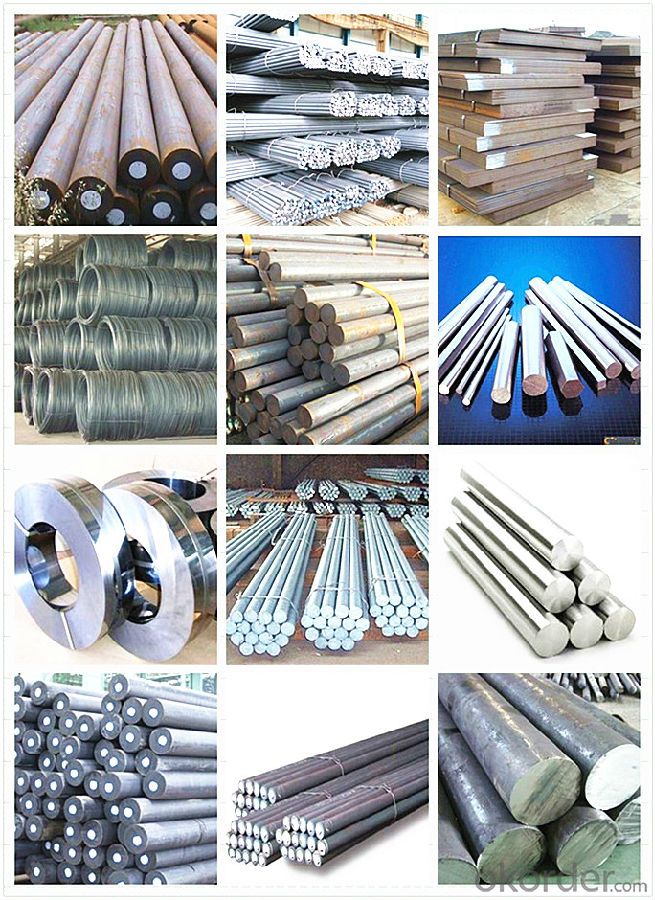
Workshop Show
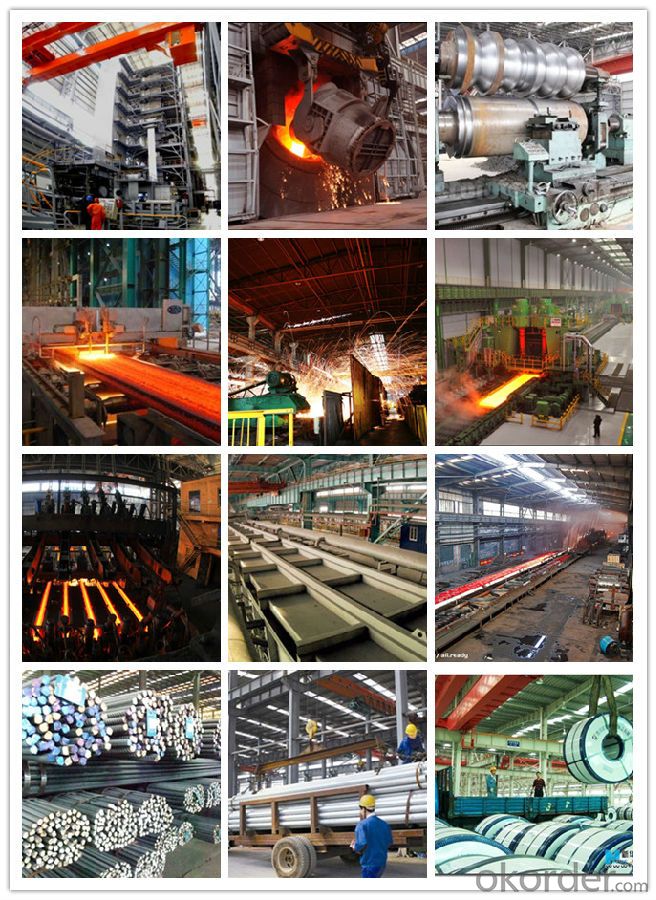
Shipping
1. FedEx/DHL/UPS/TNT for samples, Door-to-Door;
2. By Air or by Sea for batch goods, for FCL; Airport/ Port receiving;
3. Customers specifying freight forwarders or negotiable shipping methods!
Delivery Time: 3-7 days for samples; 5-25 days for batch goods.
Payment Terms
1.Payment: T/T, L/C, Western Union, MoneyGram,PayPal; 30% deposits; 70% balance before delivery.
2.MOQ: 1pcs
3.Warranty : 3 years
4.Package Informations: 1) EXPORT, In 20 feet (GW 25 ton) or 40 feet Container (GW 25 ton)
2)as customer's requirement
Why choose us?
(1) The leading exporter in China special steel industry.
(2) Large stocks for various sizes, fast delivery date.
(3) Good business relationship with China famous factories.
(4) More than 7 years steel exporting experience.
(5) Good after-sales service guarantee.
- Q: What are the different types of case-hardening steel?
- There are several types of case-hardening steels, including carburizing steels, nitriding steels, cyaniding steels, and induction hardening steels.
- Q: Can special steel be used for electrical applications?
- Yes, special steel can be used for electrical applications. Special steels such as electrical steel or silicon steel are specifically designed for use in electrical equipment and applications. These steels have low electrical resistivity and high magnetic permeability, making them ideal for use in transformers, motors, generators, and other electrical devices that require efficient electricity conduction and magnetic properties.
- Q: How does special steel contribute to the power generation industry?
- Special steel plays a crucial role in the power generation industry by providing the necessary strength, durability, and resistance to extreme temperatures and corrosive environments. It is used in the construction of turbines, generators, and other critical components, ensuring the efficient and reliable operation of power plants. Additionally, special steel's high heat resistance and excellent mechanical properties enable power plants to operate at higher temperatures, increasing energy efficiency and reducing emissions.
- Q: Can special steel be used for luxury goods?
- Yes, special steel can be used for luxury goods. Special steel often possesses superior qualities such as durability, strength, and resistance to corrosion, making it an ideal material for high-end products like luxury watches, jewelry, and accessories. Additionally, the uniqueness and exclusivity associated with special steel can enhance the appeal and desirability of luxury goods.
- Q: How does special steel contribute to the energy sector?
- Special steel plays a critical role in the energy sector, contributing significantly to its efficiency, reliability, and safety. Firstly, special steel is used in the construction of pipelines and storage tanks, which are crucial components of the oil and gas industry. These pipelines need to withstand high pressures, extreme temperatures, and corrosive environments, and special steel provides the necessary strength and resistance to ensure their integrity and prevent leakage. In addition, special steel is utilized in the manufacturing of turbine blades and other components in power generation plants. These plants require materials that can withstand the high temperatures and pressures generated by the combustion of fossil fuels or the use of nuclear energy. Special steel's heat-resistant properties make it ideal for these applications, improving the overall efficiency and longevity of power plants. Furthermore, special steel is used in the production of wind turbines, which are rapidly becoming an essential source of renewable energy. The blades, tower structures, and gearboxes of wind turbines are subjected to significant stress and strain, and special steel provides the necessary strength and durability to withstand these conditions. By using special steel, wind turbines can operate reliably and efficiently, contributing to the growth of clean energy. Moreover, the energy sector relies on special steel for its infrastructure, such as transmission towers and substations. These structures need to support heavy loads and withstand extreme weather conditions while maintaining electrical conductivity. Special steel's high strength and corrosion resistance make it a suitable material for these applications, ensuring the reliable transmission and distribution of electricity. Overall, special steel plays a crucial role in the energy sector by providing the necessary strength, durability, and resistance to extreme conditions. Its use in pipelines, power generation plants, wind turbines, and infrastructure improves the efficiency, reliability, and safety of the energy sector, facilitating the production and distribution of both conventional and renewable energy sources.
- Q: How is leaded steel used in machining operations?
- Leaded steel is commonly used in machining operations due to its improved machinability. The addition of lead to the steel composition enhances its ability to be cut, drilled, and shaped with ease, reducing tool wear and improving surface finish. This type of steel is particularly useful in high-speed machining applications, where efficiency and precision are crucial.
- Q: What are the different methods of heat treatment for special steel?
- There are several different methods of heat treatment for special steel, each designed to enhance specific properties of the steel. These methods include: 1. Annealing: This method involves heating the steel to a specific temperature and then slowly cooling it, typically in a controlled atmosphere. Annealing helps to relieve internal stresses, improve machinability, and soften the steel for further processing. 2. Normalizing: Normalizing is a heat treatment process that involves heating the steel to a temperature above its critical temperature and then air cooling it in still air. This method is commonly used to refine the grain structure of the steel, improve its mechanical properties, and enhance its strength and toughness. 3. Quenching: Quenching is a method that involves rapidly cooling the steel from a high temperature by immersing it in a quenching medium such as oil, water, or brine. This process results in the formation of a very hard and brittle structure known as martensite, which increases the steel's hardness and wear resistance. 4. Tempering: Tempering is performed after quenching and involves reheating the steel to a specific temperature and holding it there for a certain period of time, followed by air cooling. This process helps to reduce the brittleness of the steel caused by quenching and improves its toughness, ductility, and impact resistance. 5. Austempering: Austempering is a heat treatment method that involves quenching the steel from a high temperature and then holding it at a specific temperature for a prolonged period of time. This process produces a structure called bainite, which provides a combination of strength, toughness, and ductility. 6. Martempering: Martempering is a variation of quenching that involves cooling the steel to a temperature just above its martensitic transformation range and then holding it at that temperature until it becomes uniformly cooled. This method reduces the risk of distortion and cracking compared to traditional quenching and provides improved toughness and dimensional stability. 7. Induction hardening: Induction hardening is a surface heat treatment method used to selectively harden specific areas of the steel. It involves heating the surface of the steel using induction heating and then rapidly quenching it. This process results in a hardened surface layer while maintaining the toughness and ductility of the core. These different methods of heat treatment for special steel provide a range of options to optimize the desired properties of the steel, depending on the specific application and requirements.
- Q: How is high-speed tool steel used in the production of machining tools?
- High-speed tool steel is used in the production of machining tools due to its exceptional heat resistance, hardness, and wear resistance. It allows for the efficient machining of materials at high speeds, reducing production time and enhancing productivity. This steel is commonly utilized in the manufacturing of cutting tools, such as drills, milling cutters, and taps, to ensure precision and durability in machining operations.
- Q: How does special steel contribute to the defense sector?
- Special steel contributes to the defense sector in several ways. Firstly, it is used in the production of military vehicles, aircraft, and naval vessels, providing strength, durability, and resistance to extreme conditions. Secondly, special steel is utilized in the manufacturing of ballistic armor and bulletproof vests, offering enhanced protection to military personnel. Additionally, it is used in the construction of weaponry, such as firearms and artillery, ensuring reliability and precision. Overall, special steel plays a crucial role in enhancing the capabilities and safety of defense equipment and personnel.
- Q: How does special steel contribute to the electrical industry?
- The electrical industry relies heavily on special steel to produce a wide range of components and equipment required for the generation, transmission, and distribution of electricity. Power transformers, for instance, heavily rely on special steel. These transformers are crucial for adjusting voltage levels in the electricity grid, allowing for efficient transmission and distribution of electricity. Special steel, thanks to its exceptional strength, durability, and magnetic properties, is employed to construct the cores of these transformers. The high magnetic permeability of special steel ensures minimal energy loss during the transformation process, resulting in more efficient power transmission. In addition, special steel is extensively used in the manufacturing of electrical conductors, such as wires and cables. These conductors are responsible for transporting electricity from power plants to various end-use applications. Special steel wires boast excellent conductivity and resistance to corrosion, making them ideal for transmitting electricity over long distances with minimal energy loss. Moreover, special steel is employed in the production of electrical connectors and terminals, ensuring secure and reliable connections between different electrical components. The electrical industry also relies on special steel for the fabrication of electrical motors and generators. The exceptional strength and magnetic properties of special steel contribute to the efficient conversion of electrical energy into mechanical energy, ensuring the smooth operation of motors and generators. Furthermore, special steel is used in the manufacturing of electrical switches, circuit breakers, and other protective devices, guaranteeing the safe and reliable functioning of electrical systems. Overall, special steel plays an indispensable role in the electrical industry by enabling the production of essential components and equipment necessary for the generation, transmission, and distribution of electricity. Its unique properties contribute to enhanced energy efficiency, reliability, and safety in electrical systems, cementing its status as an indispensable material in this industry.
Send your message to us
Special Steel Alloy Steel Round Bar SAE8620
- Loading Port:
- China main port
- Payment Terms:
- TT OR LC
- Min Order Qty:
- 30 m.t.
- Supply Capability:
- 10000 m.t./month
OKorder Service Pledge
OKorder Financial Service
Similar products
Hot products
Hot Searches
Related keywords
